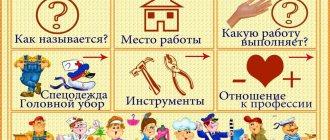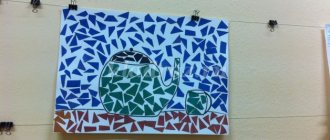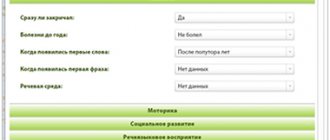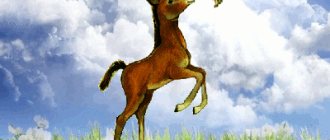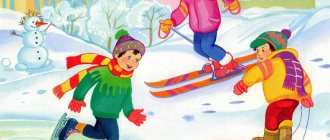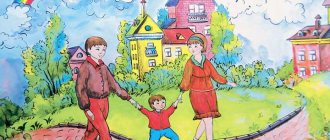On the topic: methodological developments, presentations and notes
The proposed lesson notes can be used by speech therapists when planning and conducting frontal lessons in a preparatory speech therapy group. The topic of this lesson: “Sounds B-B'.
The lesson presents games and exercises for developing skills in differentiating the prepositions “ON”, “UNDER” and their correct use in speech.
Goal: to strengthen children’s skills in conducting syllabic analysis of words; development of coherent speech by composing various types of sentences. Tasks: vocabulary replenishment, lexical and grammatical development.
Summary of the frontal lesson in the preparatory speech therapy group. “Snow White and the Dwarves” (theme “Dishes”) Goal: - elimination of the prerequisites for dysgraphia in preschoolers with OHP levels 3-4. Objectives: Correction.
Synopsis of a frontal lesson in a preparatory speech therapy group. Topic: “Sound and the letter Y.”
Topic: Wild animals in the winter forest. Program content. Consolidate knowledge about wild animals. Activate your used vocabulary. Develop the ability to identify basic properties and characteristics. Contribute .
Summary of a frontal lesson in a preparatory speech therapy group on the topic: “Sounds G - G*, letter G.” Topic: “Sounds G - G *, letter G” Goal: To consolidate skills.
Theme: "Pisces"
- consolidate nouns on the topic “Pisces” in the active dictionary, strengthen the skills of agreeing numerals with nouns; teach children to work with deformed text.
Equipment:
- Dunno picture, envelope with a letter, subject pictures with fish, fishing rod with magnet, fish for the game “Anglers”, laptop, Teremkova N.E. “Speech therapy homework for children 5-7 years old with OHP” album 4 (lexical topic “Pisces”), pictures of goldfish (11 pieces).
Progress of the lesson
I. Organizational moment.
Speech therapist: Guess the riddle: “Parents and children have all their clothes made of coins”
Who is this? How did you guess? (Children's answers)
Who do you think we will talk about today? (About fishes).
II. Main part.
1.Game "Classification"
What fish live in our aquarium? (Guppies, swordtails, angelfish, goldfish, mollies.)
If fish live in an aquarium, what are they called? (Aquarium, decorative.)
(Looking at the aquarium and fish from pictures using a laptop).
What if fish live in the river? (River)
In the lake? (Lake)
In the sea? (Marine)
What fish live in the river? Show and name. (Crucian carp, ruff, perch, pike).
In the lake? (Trout)
In the sea? (Flounder, herring, hammerhead, shark, dolphin).
What body parts do fish have? Name it, show it. (Work at the board).
2. Game "Fishermen"
(coordination of numerals with nouns).
The fish are in the “pond” - on the table. The speech therapist calls the children one by one, gives them a fishing rod and offers to catch fish. Children count the fish they catch: “I caught one fish.” When catching fish again, the child says this: “The first time I caught one fish. I now have two fish."
You can invite children to catch several fish at once. “I caught two (three, four, five) fish.” Whoever manages to catch the most fish is the winner.
3. Working with deformed text.
The speech therapist opens the envelope and addresses the children:
Dunno sent us a story. But I can't understand anything. I'll read it to you.
They put the pike in a bucket and brought it home. They took a fishing rod and a bucket. They caught a big pike on the river. Pasha and Lyosha went to the river.
Did Dunno get a story? Why? (He told everything out of order.)
Let's correct this narrative. Tell everything in order. What do you think came first?
What happened next?
How did the story end?
Why is the story called “Fishing”?
Retelling of the story "Fishing".
4. Physical education.
The children stand in a row on one side of the room, the driver is in the middle, he is a fisherman. Before starting the game, children each come up with a name for the fish.
Fisherman says:
I throw my nets into the sea,
I will catch many, many fish.
After this, the children run to the other side of the room. The driver asks the caught child: “What is your name, fish? - Crucian carp. The winner is the one who does not immediately fall into the fisherman's net.
5. Work in workbooks.
Teremkova N.E. “Speech therapy homework for children 5-7 years old with OHP” album 4 (lexical topic “Pisces”).
Task 1: distribute the fish, in what places they live (sea, river, aquarium).
Task 2: complete the missing part of the pike’s body.
6. Game “Words-relatives”.
Find related words: fish - fish, fish, fisherman, fishy, fishing, fish.
III. Final part.
Speech therapist: Who did we talk about today? Remember what kind of fish there are. Dunno has prepared a surprise for you. Everyone gets a goldfish for their work in class.
Subject:
"Who are the fish?"
Target
: develop children's ideas about fish as living creatures living in water, having a typical structure - body shape, fins, tail, etc.; develop the ability to establish cause-and-effect relationships of various types; use a subject-schematic model for generalization, make evidence-based judgments; cultivate an interest in nature.
